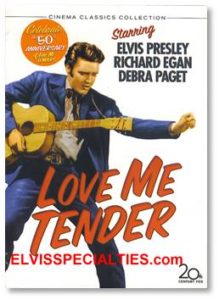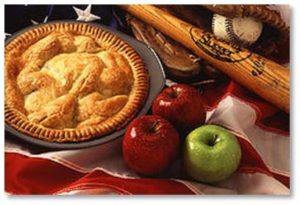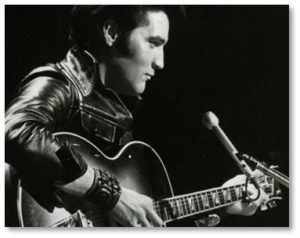Friday Author: Seth Kaplan
Many kinds of music come and go, but solo ballads and doo-wop group stylings from the 1950s, with their great voices and vocal harmonies, dance routines on stage, and expert instrumental arrangements (except for a cappella, of course), bring out a passion in their performers. Audiences who grew up with this music and younger people who sense the emotion wrapped in the lyrics, respond. Regardless of age, though, the theme in 50s ballads that forms the foundation for this passion is Love, especially love at the beginning and unrequited, or lost, love. This week, I shall talk about a solo artist; next week, about how some classic doo-wop groups sang songs powered by these same themes.
Lyrics You Will Never Forget in 50s Ballads
Many performers throughout all the ages of man used love as an eternal theme for music, poetry, song, sculpture, and other art forms. But, in the 20th century, when Americans invented jazz, the Broadway musical, and crooning, some performers and material stand out as iconic interpreters (no offense, but, if you think rap is heaven, you can stop reading right here) of the importance of love.
Elvis Presley sang three songs about love that have stuck in my mind since they were issued. For reasons that I hope will become apparent, these three songs constitute a unified narrative. The lyrics in all three are simple, yet suffused with complex feelings. The arrangements have an elegance that seems uncomplicated because no more is needed. Just a guitar and the Jordanaires (an American vocal quartet formed in 1948 as a gospel group), Elvis’s long-time vocal accompaniment, harmonizing softly. Here are the lyrics to “Can’t Help Falling In Love.”
“Can’t Help Falling In Love”
Wise men say
Only fools rush in
But I can’t help falling in love with you.
Shall I stay?
Would it be a sin
If I can’t help falling in love with you?Like a river flows
Surely to the sea
Darling, so it goes
Some things are meant to be.
Take my hand,
Take my whole life, too.
For I can’t help falling in love with you.Like a river flows
Surely to the sea
Darling, so it goesSome things are meant to be.
Take my hand,
Take my whole life, too.
For I can’t help falling in love with you
For I can’t help falling in love with you.
The singer has no expectations. He opens his heart to the woman he loves, holding nothing back, in the hope that she will respond in kind.
 In the second song, “Love Me Tender,” the singer elaborates on his feelings, hopes, and expectations in an eloquent appeal for a return of affection. Here are the lyrics:
In the second song, “Love Me Tender,” the singer elaborates on his feelings, hopes, and expectations in an eloquent appeal for a return of affection. Here are the lyrics:
“Love Me Tender”
Love me tender,
Love me sweet,
Never let me go.
You have made my life complete,
And I love you so.Love me tender,
Love me true,
All my dreams fulfilled.
For my darlin’, I love you,
And I always will.Love me tender,
Love me long,
Take me to your heart.
For it’s there that I belong,
And we’ll never part.Love me tender,
Love me dear,
Tell me you are mine.
I’ll be yours through all the years,
’Til the end of time.When at last my dreams come true
Darling this I know
Happiness will follow you
Everywhere you go.
The third song, “Are You Lonesome Tonight?” could be a sequel to “Can’t Help Falling In Love” and “Love Me Tender.” In it, we learn that the aspirations for a life with his beloved did not come to pass. The singer asks his former love about her state of mind and heart now that life has separated them for an undefined period of time. Here are the lyrics:
“Are You Lonesome Tonight?”
Are you lonesome tonight,
Do you miss me tonight?
Are you sorry we drifted apart?
Does your memory stray to a bright sunny day
When I kissed you and called you sweetheart?
Do the chairs in your parlor seem empty and bare?
Do you gaze at your doorstep and picture me there?Is your heart filled with pain, shall I come back again?
Tell me dear, are you lonesome tonight?I wonder if you’re lonesome tonight
You know someone said that the world’s a stage
And each must play a part.
Fate had me playing in love with you as my sweetheart.
Act one was when we met. I loved you at first glance.
You read your lines so cleverly and never missed a cue.
Then came act two. You seemed to change, you acted strange,And why I’ll never know.
Honey, you lied when you said you loved me,
And I had no cause to doubt you.
But I’d rather go on hearing your lies
Than to go on living without you.
Now the stage is bare and I’m standing thereWith emptiness all around
And if you won’t come back to me
Then they can bring the curtain down.
Is your heart filled with pain, shall I come back again?
Tell me dear, are you lonesome tonight?
 In what is probably the longest bridge ever written for a song, the composer created an interior monologue bracketed by questions the singer would like to ask his former love, if only she were there to hear and respond. Referencing Hamlet’s soliloquy, the singer recounts the extent of his understanding of how her betrayal hurt him. His unrequited love leads him to say that living a lie with her would be preferable to living without her. The latter causes him to extend the theatrical metaphor to embrace his death.
In what is probably the longest bridge ever written for a song, the composer created an interior monologue bracketed by questions the singer would like to ask his former love, if only she were there to hear and respond. Referencing Hamlet’s soliloquy, the singer recounts the extent of his understanding of how her betrayal hurt him. His unrequited love leads him to say that living a lie with her would be preferable to living without her. The latter causes him to extend the theatrical metaphor to embrace his death.
1950s Folks Understood the Basics Elements of Life
 After World War II and the Korean War, the American public possessed an exquisite understanding of what constituted the important things in life: Patriotism, family, baseball (the Great American Pastime), national spirit, and faith, as well as elements from the previous generation: Motherhood, hot dogs, apple pie. Knowing how fragile life could be helped the citizenry keep one other thought in mind: The power of unconditional love. Their music, among other things, reflected that awareness.
After World War II and the Korean War, the American public possessed an exquisite understanding of what constituted the important things in life: Patriotism, family, baseball (the Great American Pastime), national spirit, and faith, as well as elements from the previous generation: Motherhood, hot dogs, apple pie. Knowing how fragile life could be helped the citizenry keep one other thought in mind: The power of unconditional love. Their music, among other things, reflected that awareness.

